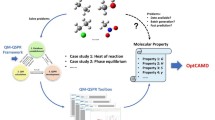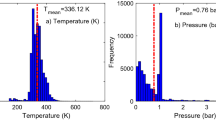Summary
Estimation methods developed over years by S. W. Benson and co-workers for calculation the thermodynamic properties of organic compounds in the gas phase are applied to a pharmaceutical real process with all type of non-idealities. The different strategies used to calculate the reaction enthalpy of a chemical process, in the absence of data for complex molecules, using the Benson group additivity method are presented and also compared with the experimental value of reaction enthalpy obtained using reaction calorimetry (Mettler-Toledo, RC1®). We demonstrate that there are some strategies that can be followed to obtain a good estimation of the reaction enthalpy in order to begin the safety assessment of a chemical reaction. This work is part of an industrial project [1] in which the main objective was the risk assessment of chemical real and complex processes using the commonly available tools for the SMEs (with limited resources).
Similar content being viewed by others
Author information
Authors and Affiliations
Rights and permissions
About this article
Cite this article
Nomen, R., Bartra, M., Sempere, J. et al. The estimation of reaction enthalpy for complex molecules using Benson groups</o:p>. J Therm Anal Calorim 82, 581–584 (2005). https://doi.org/10.1007/s10973-005-0937-6
Issue Date:
DOI: https://doi.org/10.1007/s10973-005-0937-6




